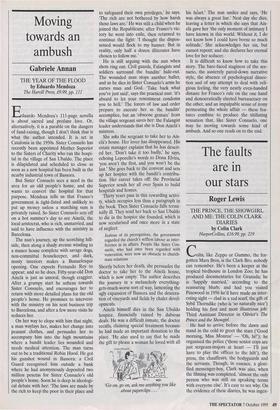Moving towards an ambush
Gabriele Annan
THE YEAR OF THE FLOOD by Eduardo Mendoza The Harvill Press, £9.99, pp. 111 Eduardo Mendoza's 111-page novella is about sacred and profane love. Or, alternatively, it is a parable on the dangers of fund-raising, though I don't think that is what the author intended. It is set in Catalonia in the 1950s. Sister Consuelo has recently been appointed Mother Superior to the Sisters of Charity who run the hospi- tal in the village of San Ubaldo. The place is dilapidated and scheduled to close as soon as a new hospital has been built in the nearby industrial town of Bassora.
But Sister Consuelo sees a need in the area for an old people's home, and she wants to convert the hospital for that purpose. Mendoza tells us that Franco's government is tight-fisted and unlikely to put up money unless a matching sum is privately raised. So Sister Consuelo sets off on a hot summer's day to see Aixela, the local aristocrat, who is rich, unmarried, and said to have influence with the ministry in Barcelona.
The nun's journey, up the scorching hill- side, then along a shady avenue winding to a manor house complete with savage dogs, non-committal housekeeper, and dark, musty interiors makes a Bunuelesque opening. One expects Fernando Rey to appear; and so he does. Fifty-year-old Don Aixela is just as amoral, though craggier. After a grumpy start he softens towards Sister Consuelo, and encourages her to return with more detailed plans for the old people's home. He promises to intervene with the ministry on his next business trip to Barcelona, and after a few more visits he seduces her.
On her way to elope with him that night, a man waylays her, makes her change into peasant clothes, and persuades her to accompany him into the high mountains where a bandit leader lies wounded and needs medical attention. The man turns out to be a traditional Robin Hood. He got his gunshot wound in Bassora: a Civil Guard recognised him outside a bank where he had anonymously deposited two million pesetas for Sister Consuelo's old people's home. Soon he is deep in ideologi- cal debate with her: 'The laws are made by the rich to keep the poor in their place and to safeguard their own privileges,' he says. 'The rich are not bothered by how harsh those laws are.' He was still a child when he joined the Republicans; after Franco's vic- tory he went into exile, then returned to continue the fight: 'I thought the dispos- sessed would flock to my banner. But in reality, only half a dozen illiterates have chosen to follow me.'
He is still arguing with the nun when shots ring out. Civil guards, Falangists and soldiers surround the bandits' hide-out. The wounded man stops another bullet, and as he dies in Sister Consuelo's arms he curses man and God. 'Take back what you've just said', says the practical nun: 'it's absurd to let your resentment condemn you to hell.' The forces of law and order prepare to execute her as the bandits' accomplice, but an 'obscene gesture' from the village sergeant saves her: the Falangist leader understands that she is Don Aixela's mistress.
She asks the sergeant to take her to Aix- ela's house. Her lover has disappeared. His estate manager explains that he has desert- ed her. 'Don't take it too badly,' he says, echoing Leporello's words to Dona Elvira, 'you aren't the first, and you won't be the last.' She goes back to the convent and sets up her hospice with the bandit's contribu- tion. Her career takes off: the Provincial Superior sends her all over Spain to build hospitals and homes. Thirty years pass in this rewarding activi- ty, which occupies less than a paragraph in the book. Then Sister Consuelo falls termi- nally ill. They send her back to San Ubaldo to die in the hospice she founded, which is now secularised and once more in a state of neglect:
Jealous of its prerogatives, the government regarded the church's selfless labour as inter- ference in its affairs. People like Sister Con- suelo, who had once been regarded with veneration, were now an obstacle to church- state relations.
Shortly before her death, she persuades the doctor to take her to the Aixela house, which is now empty. The author describes the journey in a melancholy everything- gets-much-worse sort of way, lamenting the ugly expansion of Bassora and the desecra- tion of vineyards and fields by chalet devel- opments.
Aixela himself dies in the San Ubaldo hospice, financially ruined by dubious deals. He was a difficult inmate, the doctor recalls, claiming special treatment because he had made an important donation to the place. 'He also used to say that he made the gift to please a woman he loved with all 'Go on, go on, ask me anything you like about paperclips . ' his heart.' The nun smiles and says, 'He was always a great liar.' Next day she dies, leaving a letter in which she says that Aix- ela gave her 'the only moment of intimacy I have known in this world. Without it, I do not know how I could have borne so much solitude.' She acknowledges her sin, but cannot repent; and she declares her eternal love for her seducer.
It is difficult to know how to take this story. The bare-faced staginess of the sce- nario, the austerely pared-down narrative style, the absence of psychological dissec- tion and of any attempt to deal with reli- gious feeling, the very nearly even-handed distaste for Franco's rule on the one hand and democratically elected bureaucracy on the other, and an impalpable sense of irony permeating the whole affair — these fea- tures combine to produce the titillating sensation that, like Sister Consuelo, one may be moving towards some kind of ambush. And so one reads on to the end.










































































 Previous page
Previous page